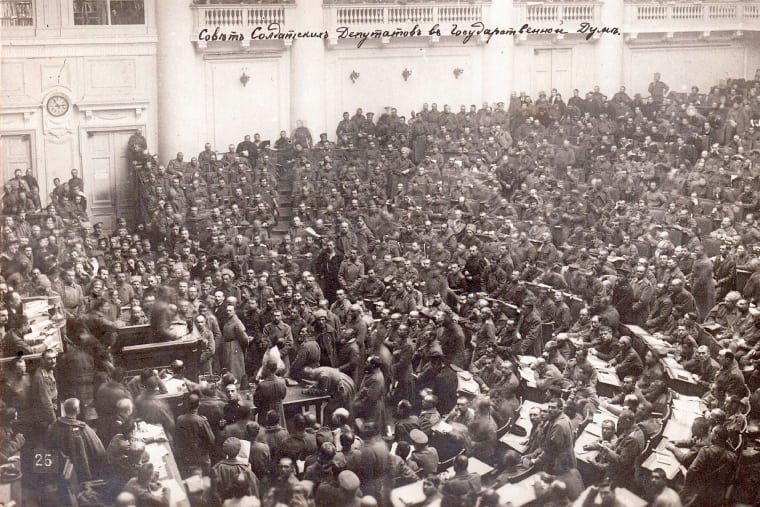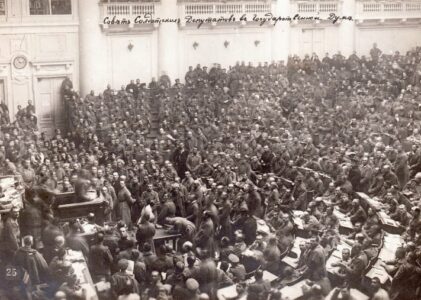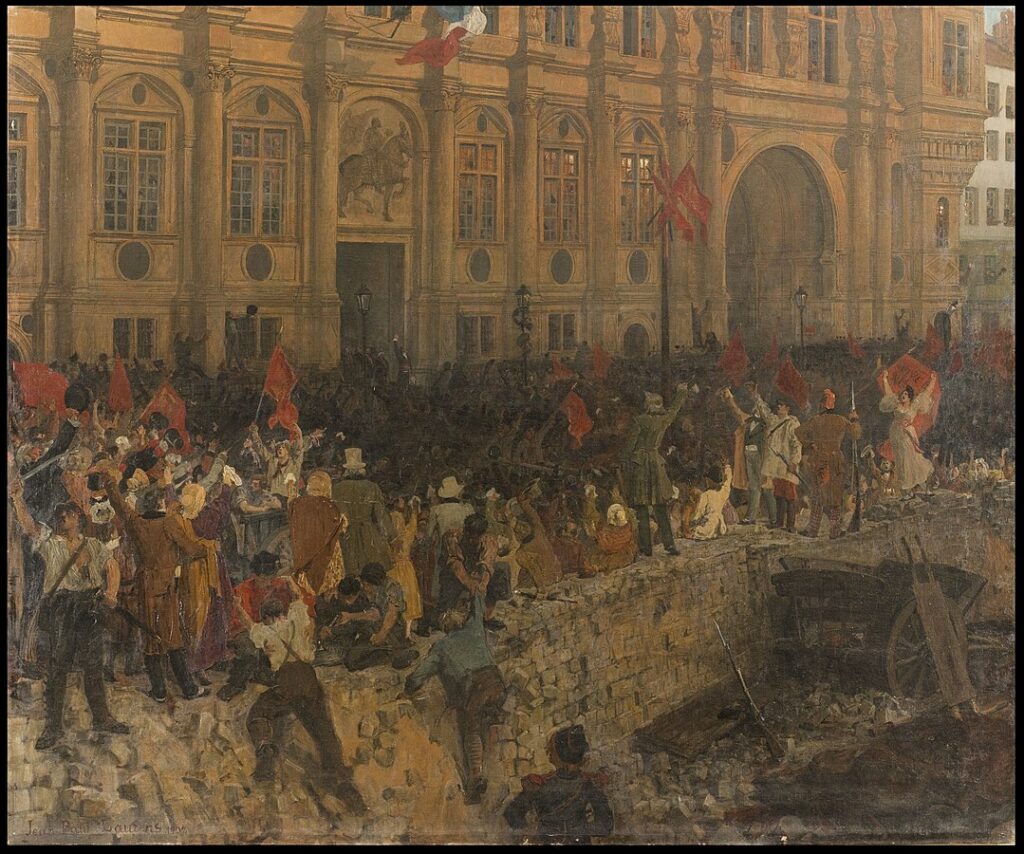By Alexander Rakhmetov and László Molnárfi
“Crowned heads, wealth and privilege may well tremble should ever again the Black and Red unite!”
– Otto von Bismarck (1872)[1]
Anarchists and libertarian Marxists have significantly more in common than they have apart. Nearly every social anarchist is bound to borrow heavily from Marxist class analysis and most believe in at least some portions of Marxian economics. Citations of situationists and autonomists flow like wine. Libertarian Marxists, in turn, are highly tuned in to anarchist discussions of tactics, strategy, and avoidance of bureaucratisation. In practice, however, these two movements segregate themselves from each other; the tone of many discussions is one of bickering. Rather than using the common ground shared by the two to create a synthesis of the best aspects of both approaches, such discussions all too often devolve into accusations of authoritarianism against the Marxists and accusations of idealism against the anarchists. Every such argument inevitably ends by arguing about what Karl Marx “really” believed or meant[2].
The vast majority of these arguments come back to definitions. What is a state? Is a dictatorship of the proletariat a one-party nightmare of despotism or the destruction of institutions reproducing bourgeois rule? The necessity for such clarifications is endless.
Not only does such an overload of jargon divide us, it is needlessly confusing to the average worker. Given how time is a luxury in today’s society and given how many people are eternally on-call, burying oneself in theory just to understand the basics of libertarian socialism is seldom a reasonable proposition.
There is a time and place for academic discussion and associated jargon, but we must be as clear as possible and avoid specialized language unless it enhances clarity. Obscurantism alienates us and pits us against each other. Let us work together instead.
So what can we rally around? What is our common platform?
- Our end goal is a directly democratic society based on councils. Both civil society and the economic sphere must be democratic. Indeed, the distinction between the two must be dissolved. Anarchists call this anarchy. Syndicalists call this syndicalism. Libertarian Marxists call this the democratic dictatorship of the proletariat. The councils create the ground on which socialism (and communism) arises[3]. It is precisely this state of affairs that combines mass democracy with decisive action. Marxists often call such an arrangement a commune-state, though this causes needless confusion and conflict. Truthfully, this cannot really be called a state: the whole point is to avoid a bureaucratic apparatus above society. We will not be calling it a state here. Due to the challenges of the real world, this society may not be as completely horizontal as we prefer. Compromises will have to be made. We must nevertheless strive towards the egalitarian ideal.
- Revolutionaries must create groups around shared political goals. Anarchists variously call this a specifically anarchist organisation in platformist parlance[4], an affinity group, and many other names. Syndicalists would integrate this into a revolutionary trade union. Libertarian Marxists generally call this a party, much to the chagrin of anarchists. The sum total of such groups is what Leninists would call a vanguard. This is not necessarily Leninist: it is obvious that some sections of the populace are more radical and farsighted than others. Historically, successful socialist revolutionaries such as the multitude of participants of the 1917 October Revolution and the lead-up to it had to adopt a pre-figuratively decentralized approach focused on the action of the masses, resembling anarchist platformism. This even includes the Bolsheviks before taking power; the Bolsheviks floundered precisely when they centralized after taking power[5]. The triumph of the single centralized party over a multitude of democratic groups is thus a myth disproved by the reality of organizing for revolution. Political groups must organically involve themselves in mass movements and organisations (i.e. trade unions, student unions, community single-issue groups, anti-war campaigns, etc.) while pushing them towards class consciousness without domineering.
- To paraphrase Murray Bookchin, the vanguard must dissolve into the councils[6]. We must reproduce socialism by participating in the councils, not by imposing it from above. Thus, we are not vanguardist in the Leninist sense. We do not believe in an elite-led dictatorship reigning above the councils. Socialism shall exist by being perpetually renewed through a socialist majority in the councils or not exist at all. If counter-revolution knocks on the door then it shall have to yank socialism out of thousands of power-centers; workplaces, neighborhoods and militias, rather than just decapitate a “central committee”. We propose the scaffolding of socialist pluralism, civil liberties and the democratic development of socialism around the councils as the strongest bulwark of revolution, let alone its potential in supporting the logistics of delivering robust governance.
It is hoped that this sketch of the concrete essence of revolutionary activity will inspire anarchists and libertarian Marxists alike to sidestep the jargon of revolutionary socialism and work towards the common goal of building a new world in the shell of the old based on the system of council democracy – as well as Leninists to reconsider their attachment to historical forms that are either mythical (the centralized party), confused (vanguard/vanguardism) or failed (elite-led dictatorship over the councils).
This quote is disputed. ↑
Such arguments are ultimately pointless, as Marx was a human being who changed his views over time. It should not even matter what a “prophet” thought anyways if one is serious about pursuing scientific socialism. ↑
As a brief sidenote, the distinction between socialism and communism in our usage is that under socialism, the planned economy has to ration goods and under communism it does not. The transition is fluid as some goods are a lot more scarce than others. ↑
“Dielo Truda”. Organizational Platform of the General Union of Anarchists (Draft). 1926. Organizational Part. https://www.nestormakhno.info/english/newplatform/organizational.htm ↑
McKay, Ian. The Bolshevik Myth Reloaded. 2017. https://theanarchistlibrary.org/library/anarcho-the-bolshevik-myth-reloaded#toc1 ↑
Bookchin, Murray. Listen, Marxist!. 1971. https://theanarchistlibrary.org/library/murray-bookchin-listen-marxist The direct quote is “Anarcho-communists do not seek to rear a state structure over these popular revolutionary organs but, on the contrary, to dissolve all the organizational forms developed in the prerevolutionary period (including their own) into these genuine revolutionary organs”. ↑
Reprint this as a 2-page document by downloading it here:




